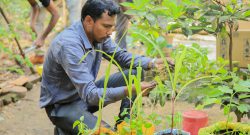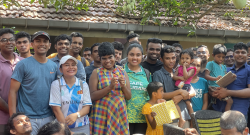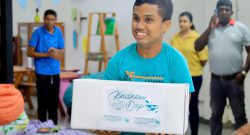Author: Admin
International Tea Day: Celebrating the Impact of Tea on Kindness and Sustainability
Tea tells a million stories, and one of them is the impact and ripple effect it has on our lives, ecosystems, and the people whose livelihoods are tied to it. Check out the video to discover the powerful role Camellia sinensis plays in empowering people, protecting our planet, and affecting positive changes in our world. #Dilmah #CeylonTea #FamilyOwned #FamilyBusiness #DilmahFamily #FamilyFirst #MerrillJFernando #TeaWithLove #ServingHumanity #CupOfKindness #EthicalBusiness #Integrity #Tea #EthicalTea #PremiumTea #BetterTea #TeaInspired #GreatTaste #NaturalGoodness #EthicalPurpose #MakingTheWorldABetterTea
Continuing a Legacy: The First “Kindness Day – In Memory of Merrill J. Fernando”
Our Founder dedicated his life to tea and kindness. We remembered him on what would have been his birthday, the very first “Kindness Day – In Memory of Merrill J. Fernando”. We celebrated our Founder’s legacy of serving humanity through acts of kindness towards the people and communities he so loved and nature that he cared for so dearly. Check out the video to see how the impact of his legacy lives on.
Taking Kindness Day to the East
Our MJF Foundation and Dilmah Conservation teams in Kalkudah, the far East of Sri Lanka shared their cup of kindness with the St. John’s Elders Home in Batticaloa. The elders were entertained with a day of singing, games and a scrumptious tea. Meanwhile, the St. John’s Home garden was spruced up by our team, as they weeded, pruned and planted new fruit, veg and flowering plants to add some beauty and sustainable food sources to the Home too.
Kindness Day on Kahawatte Plantations
Our Founder dedicated his life to tea and kindness. Honouring them both, our team at the Kahawatte Plantations (KWPL) shared a cup of kindness with all members of the diverse plantation communities. From medical camps for senior citizens to ration distributions for families, our KWPL region was a heart-warming sight to behold on 6th May.
Adding Kindness, Joy and Goodness, One Leaf at a Time!
There is more than one way to share a cup of kindness. Our teams in Kalkudah, Moratuwa and Peliyagoda spread love and goodness through weeding, growing and planting beautiful home gardens for several of the elder homes in the vicinity. Our team at Ceylon Tea Trails joined in the action at Norton Bridge too, clearing out the vicinity of community schools
Hospitality and Kindness Combined – Resplendent Ceylon Joins Dilmah’s Kindness Day.
Our Dilmah family, including our esteemed tourist ventures – Cape Weligama, Ceylon Tea Trails, Wild Coast Tented Lodge, Kayaam House, and Ahu Bay – came together to spread kindness across the beautiful coasts and hills of Sri Lanka! In a collective effort to give back to our communities, our teams organised clean-up activities, revitalised community schools and elderly homes and distributed essential food items. But beyond these practical acts of kindness, they also shared joy and positivity, bringing smiles to many faces. Their “resplendent” spirits were truly reflected in their dedication and commitment to making a meaningful impact on the lives of others. We are proud of their efforts and thankful for the love and goodwill they continue to spread throughout our cherished island home.
Distribution of 1550 Food Ration Packs Across Sri Lanka
In celebration of the inaugural “Kindness Day – In Memory of Merrill J. Fernando,” we coordinated the distribution of 1550 ration packs containing essential items to support those in need across various locations in Sri Lanka. These packs were delivered to communities in Kolonnawa, Pallansena, Maligawatte, Peliyagoda, Moratuwa, Kalkudah, Thoppigala, Weligama, Jaffna, and Hunuwella.
Uniting for the Inauguration of “Kindness Day – In Memory of Merrill J. Fernando”
On May 6th, 2024, we honoured the birthday of our beloved late Dilmah Founder, Merrill J. Fernando, with the commemoration of the first-ever “Kindness Day – In Memory of Merrill J. Fernando”. This annual program will pay tribute to his philosophy of kindness towards people and nature. To mark this occasion, the staff of Dilmah Sri Lanka, including employees from Kahawatte Plantations, Dilmah Conservation, MJF Foundation, and Resplendent Ceylon, devoted the latter half of their work day to voluntary programs conducted nationwide. This is what our Dilmah family did! More than 100 of us volunteered across 12 locations in Sri Lanka. We spent time with the elderly, renovated and cleaned community schools and homes, organised a delightful afternoon for young patients at Suwa Arana – a Place for Healing, and assisted the elderly in cultivating their home gardens. In addition, over 1550 ration packs of food items were distributed throughout the island from Pallansena; the birthplace of our Founder, to Peliyagoda, Kalkudah, Weligama, Jaffna, Moratuwa and more!








